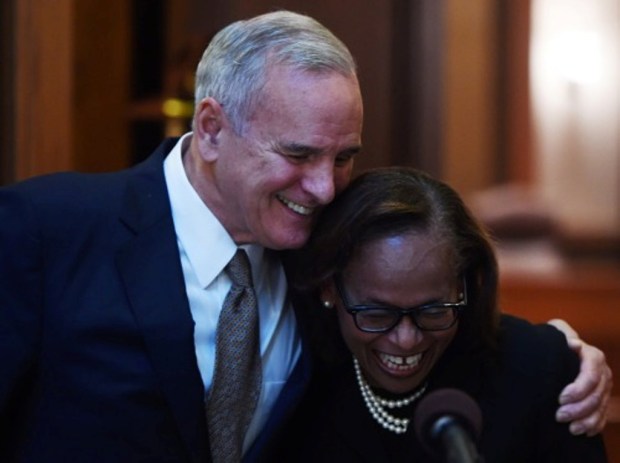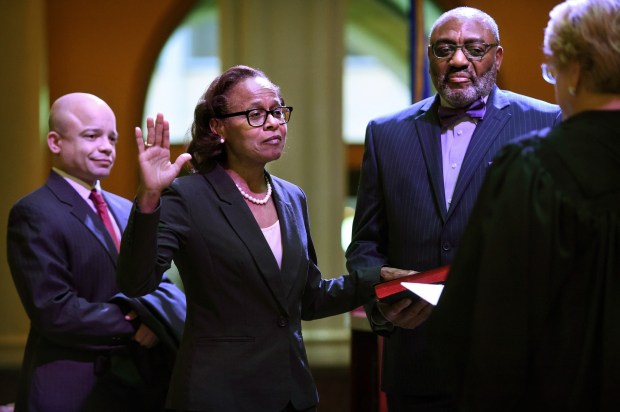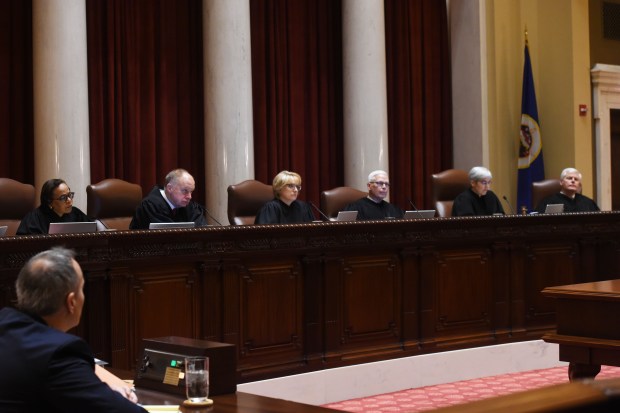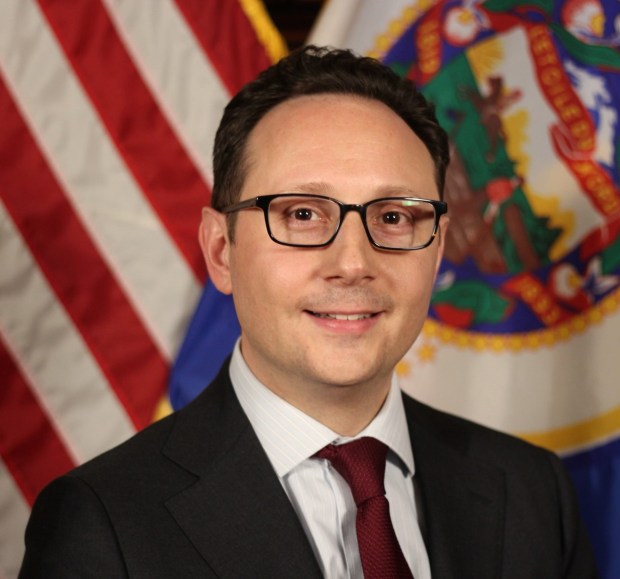Minnesota Supreme Court Associate Justice Natalie Hudson will be the state’s next chief justice, and the third woman and first person of color in the role, Gov. Tim Walz announced Wednesday.
Hudson served as St. Paul city attorney from 1992 to 1994. She went on to practice criminal appellate law in the Minnesota Attorney General’s Office for eight years and she served as a Minnesota Court of Appeals judge for 13 years.
In 2015, Gov. Mark Dayton appointed Hudson to the Minnesota Supreme Court.

Hudson, 66, of Woodbury, will take over as chief justice when Lorie Gildea retires in October. Gildea was appointed chief justice in July 2010 and elected in 2012 and 2018. Her term would otherwise expire in January 2025.
Addressing a crowd at the Capitol rotunda on Wednesday, Hudson said she would continue the pandemic-era work started by predecessor, Gildea, to determine which judicial processes could go fully remote or hybrid, and which should be in person.
Hudson said the Supreme Court justices often disagree “without being disagreeable,” and their primary commitment is to the rule of law. She also expressed interest in an ongoing study surrounding improving public access in the court system.
Also on Wednesday, Walz announced that Karl Procaccini will serve as Supreme Court associate justice, filling the vacancy that will occur when Hudson becomes chief justice.
Procaccini teaches law at the University of St. Thomas School of Law, and previously served as general counsel in Walz and Lt. Gov. Peggy Flanagan’s offices. Before that, he was a partner at Greene Espel PLLP, a law firm in Minneapolis. He has never served before as a judge, which is not unprecedented for appointees to judicial office, but still drew criticism Wednesday from Republican state lawmakers.
‘Tremendous responsibility’

Hudson said in a statement that she regards the job of chief justice as “a tremendous responsibility that I approach with humility and resolve, seeking to continue the work of my predecessors in administering one of the best state court systems in the nation, and always seeking to deliver the most accessible, highest-quality court services for the citizens of Minnesota.”
There have been 21 chief justices on the Minnesota Supreme Court since 1849, two of which have been women, “but not one of them has been a person of color,” Lt. Gov. Peggy Flanagan wrote on social media. “Today, Justice Natalie Hudson is making history as the first Black woman appointed to lead our state’s judiciary.”
Walz called Hudson “one of our state’s most experienced jurists.”
“She has a strong reputation as a leader and consensus builder,” he said in a statement. “I know that she will use her decades of judicial experience and deep understanding of our justice system to lead the Judicial Branch with a steady hand and strong conviction. I am confident that she will advance a vision that promotes fairness and upholds the dignity of all Minnesotans.”
Hudson earned her bachelor’s degree from Arizona State University and her law degree from the University of Minnesota Law School. She began her legal career in 1982 as a staff attorney with Southern Minnesota Regional Legal Services, representing clients with little money who had housing issues.
She moved into private practice with Robins, Kaplan, Miller and Ciresi in Minneapolis. She then became assistant dean of student affairs at Hamline University School of Law before taking over as St. Paul City Attorney. In 1994, she became an assistant attorney general for the state in the criminal appeals and health licensing divisions.
She served as a member of the original Minnesota Supreme Court Racial Bias Task Force from 1991 to 1993 and later served on the task force’s implementation committee. She is on the advisory boards for Minnesota Women Lawyers and for the University of Minnesota Law School.

Hudson is a member of the Judicial Division of the American Bar Association, the Minnesota State Bar Association and the Minnesota Association of Black Lawyers.
She is married to Rev. Willie Hudson, a former pastor with St. John’s Missionary Baptist Church in North Minneapolis who also served as a St. Paul Police chaplain in the 1970s and ‘80s. Their son Kobie Hudson is an attorney with the Minnesota Bureau of Criminal Apprehension.
Both Hudson and Procaccini will assume their new roles on the Supreme Court on Oct. 2.
Reaction to appointments
Minnesota Attorney General Keith Ellison on Wednesday praised both picks in a written statement, calling Hudson — who focused on criminal appellate law while with the attorney general’s office for eight years in the late 1980s and early ’90s — “a phenomenally talented jurist. She commands the trust and respect of the entire judiciary. She blends kindness and professionalism with a sharp legal mind. I am certain she will serve the state of Minnesota very well.”
Other legal observers, including some self-described middle-of-the-road Republicans, supported Hudson’s appointment. A former student attorney who had worked under her in the attorney general’s office in the 1990s recalled her as “scary smart, without being scary about it.” Hudson led a Bible study group outside work, leading some around her at the time to assume she had conservative leanings, but he said he never had a sense of politics entering her legal decisions.
Procaccini’s appointment drew some ire from Republicans, who called him a leading voice within the governor’s office, in the early days of the pandemic, for shutting businesses for weeks on end to minimize exposure to COVID-19. He also was closely involved in the state response to the riots that followed the 2020 death of George Floyd, a Black man killed by a white police officer in Minneapolis.
”I’m proud of that work,” Procaccini said, in response to a reporter’s question at the rotunda press conference on Wednesday. “I’m proud of the team that did it. I don’t have any apologies.”
House Minority Leader Lisa Demuth, R-Cold Spring, issued a statement saying Walz had missed “an opportunity to select a pragmatic voice and ensure Minnesotans have a diverse set of views on the Minnesota Supreme Court. Instead, he picked the chief architect of the 2020 lockdowns and mandates that destroyed businesses and kept our kids out of the classroom with zero judicial experience to serve on the state’s highest court.”
Demuth’s statement made no mention of Hudson.

Procaccini was recognized for his work on the state’s response to COVID-19, and was named a 2020 Attorney of the Year by Minnesota Lawyer. He also received the 2021 Public Attorney Award of Excellence from the Public Law Section of the Minnesota State Bar Association.
The governor said he helped steer the state’s legal decision-making around the pandemic with compassion for the most vulnerable.
“With an exceptional legal mind, Karl navigated Minnesota through one of the most difficult periods in our history,” Walz wrote on social media. “There is no one more prepared for this important role.”
Procaccini earned his bachelor’s degree from Harvard College, master of laws degree in international and comparative law from the American University in Cairo and his law degree from Harvard Law School.
Ellison, who worked with Procaccini when he was the governor’s chief counsel, said in his statement, “We got to see how smart he is and he will also provide good service to the state.”
This post was originally published on this site be sure to check out more of their content.








